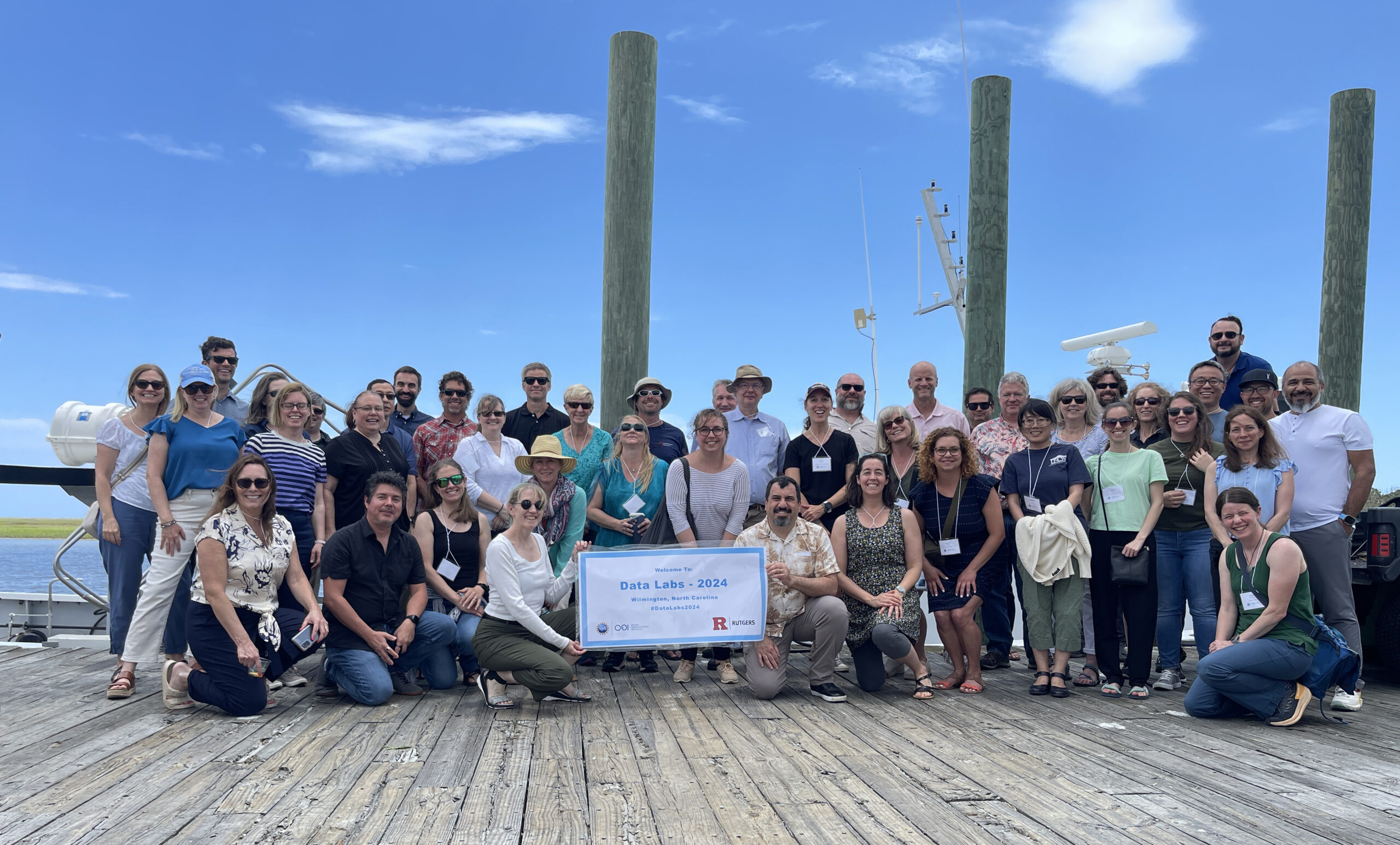
Data Labs workshop participants pose at the end of UNC Wilmington’s pier during Day 2 of the
workshop.
Members of Rutgers University Center for Ocean Observing Leadership (RUCOOL) hosted a data literacy workshop in Wilmington, North Carolina on June 2-5. Led in part by Janice McDonnell and Sage Lichtenwalner, the workshop involved nearly 50 professors from across the country learning about each other’s experiences teaching at various institutions, including community colleges, primarily undergraduate institutions, and R1 universities. This diverse mix led to innovative ideas on engaging students with messy, raw data collected by the Ocean Observatories Initiative (OOI). The OOI is a long-term ocean measuring network, funded by the National Science Foundation (NSF).
More than 900 instruments measure various geophysical processes throughout the ocean water column, from the air-sea exchange at the surface to the deep seafloor below. This data is used by researchers to answer bigger questions related to climate variability, ecosystem dynamics, ocean circulation, and plate-scale geodynamics.
All of this data is freely available online. However, it’s 10 to 12 terabytes of high-quality data collected each month for years and years. It takes focused dedication to go through.
For over a decade, McDonnell and Lichtenwalner have collaborated with various Rutgers departments and outside institutions to create new, lasting ways to easily visualize and play with big datasets. This past year, they have collaborated with faculty from Queens College, Hillsborough Community College, Stockton University, and Carleton College to relaunch one of their biggest projects, Data Labs.
Data Labs is an NSF funded project aimed at higher education faculty, developing education plans that use the big data collected by the OOI in their general courses. These professors gain practice using the data visualization tools available to chunk the OOI’s raw data into workable teaching data sets. They also collaborate to create teaching plans that they can implement in their own classrooms.
“I don’t remember the last time I learned so many things in such a tight time frame,” said Christa Haney of Mississippi State University. “And all of it I can apply in my teaching–I’m using it in my class right now.”
Wilmington was chosen in honor of the Ocean Observatories Initiative (OOI)’s Pioneer Array being moved toward the Mid-Atlantic Coastal Shelf for new measurements. Stace Beaulieu, an OOI specialist at Woods Hole Oceanographic Institution, and Mike Muglia, from Coastal Sciences Institute, explained its significance to all that attended.
The water off Cape Hatteras is actually a “confluence of many different water masses from north and south of here,” Muglia discussed.
Participants were treated to two tours by local hosts, University of North Carolina Wilmington’s Center of Marine Sciences and Cape Fear Community College.
Local hosts at UNC Wilmington led the participants through a tour of their laboratory and pier, where researchers collect data on the intercoastal waters. Local hosts at Cape Fear Community College showcased their facilities, highlighting the much-needed technical focus of study they offer.
“Our local hosts are an embodiment of the ethos of this workshop,” McDonnell explained. “It’s all about engaging educators in higher education institutions that are often overlooked at other similar workshops and conferences.”
The workshop days were covered by Rutgers’ RUCOOL’s instagram, @rutgers_rucool. Future workshops are currently being planned.

Data Lab Workshop Organizers, L-R, top row: Jean Anastasia (SUNY Suffolk Community College), Karen Bridges (Howard Community College), Dax Soule (Queens College), Janice McDonnell (Rutgers University), Sage Lichtenwalner (Rutgers University), Stace Beaulieu (Woods Hole Oceanographic Institution)
Bottom row: Jacqui Degan (Cape Fear Community College), Kristin O’Connell (Carleton College), Anna Pfeiffer-Herbert (Stockton University), Mitaali Taskar (Rutgers University), Denise Bristol (Hillsborough Community College) Not Pictured: Phil Bresnahan (University of North Carolina Wilmington), Jason Rogers (Cape Fear Community College), Joe Long (University of North Carolina Wilmington), Mike Muglia (Coastal Studies Institute), Lynn Leonard (University of North Carolina Wilmington).
Editor’s note: This article was written by Mitaali Taskar, a science communicator and research project assistant with Rutgers Department of Marine and Coastal Sciences, Rutgers School of Environmental and Biological Sciences.

